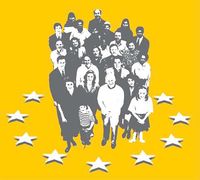|
Promote awareness raising for EU Citizenship issues in the new member states through printed and electronic information material (distributed to relevant bodies as well as to the wide public), workshops (offered to special target groups), panel discussions (for the public) and live Radio/TV programs. The need for relevant, accurate, immediate and easy-to-access information is satisfied using an innovative communication tool, an automated call-answer centre (ACC).
General Objectives
Extending EU Citizenship to the Eastern End of Europe was funded by the EU Commission DG Justice, Freedom and Security. It was launched on Wednesday, January 25, 2006. The main goal of the project was to inform the public about their rights as EU citizens as well as about the rights of those who live in the EU and are not citizens. Information regarding EU citizenship and fundamental rights was made available through an automated interactive call center, specialized booklets, workshops, information days, panel discussions and radio and TV programs.
Advisory Committee
The project was monitored and advised by an Advisory Committee that included the following:
- Yiannis Laouris, President of the Technology for Peace initiative and Chair of Cyprus Neuroscience and Technology Institute
- Hayat Hüsseyin Yasamsal, President of Olive Branch
- Devrim Yasamsal, Secretary of Olive Branch
- Maria Hadjipavlou, President of Peace Centre Cyprus
- Harry Anastasiou, Professor of Peace Studies, Portland State University
Results
Training in topics relevant to EU Citizenship has been delivered to specialized groups such as: teachers, activists, school counsellors, civil servant etc. A total of 150 teachers have participated in a two day training workshop on teaching methodologies, and ways of approaching issues of interculturalism, diversity, human rights, and other European Ideals. Curriculum units for high schools focusing on selected fundamental human rights have been developed and will be submitted to the Ministry of Education for inclusion in their regular curriculum. Clearly the particular project has resulted to strengthened ties with the Ministry of Education, Schools and teachers themselves. It is worth mentioning that a network of approximately twenty four teachers has been collaborating with us in seeing through the aforementioned action.
